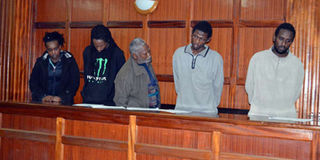Antiterrorism policy should be tempered with human rights

Lydia Nyawira Mburu, Anthony Kitila Makau, John Maina Kiarie, Mohammed Osman Nane and Abdimajit Hassan Adan at the Milimani Law Courts on March 16, 2018. They are accused of planning a major attack in Nairobi. PHOTO | FILE | NATION MEDIA GROUP
What you need to know:
Kenya and Tanzania became the cradle of terrorism by default when, on August 7, 1998, the first terror attacks happened in Nairobi and Dar es Salaam.
The police seems to wear the hat of the prosecutor and the judge, too, as far as terrorism is concerned.
Terrorism ought to be handled in a way that preserves human rights and the country’s image.
There have been reports of young men disappearing from homes, mostly picked up by ‘strange people’.
In the past few weeks, reports have shown that the practice is still going on, mainly in the coastal towns and other largely Muslim neighbourhoods.
The disappearances are not in the hands of gangs, but are allegedly by security forces.
Kenya and Tanzania became the cradle of terrorism by default when, on August 7, 1998, the first terror attacks happened simultaneously in Nairobi and Dar es Salaam. Our peaceful country, as we knew it, changed forever.
BOMB CITIES
Terrorism then became a problem not just for East Africa but the world. Many cities — such as New York, London and Paris — were caught up in the menace numerous times. Afghanistan became synonymous with terrorism when it was discovered that the terror group Al-Qaeda was embedded in the country and was sending emissaries around the world to bomb cities and Western interests.
That died down but, in the lull, we discovered that Al-Shabaab, in Somalia, were of the same ilk and fighting nearly on the same principles of Islamism as Al-Qaeda.
Kenya has been in the eye of the storm of Al-Shabaab attacks and we bear witness to many of them. As a result, we have had our fair share of post-terrorism challenges.
TRAVEL ADVISORIES
Our critical tourism industry was almost brought to its knees. Travel advisories by our major tourism markets over the years goes to show the adverse effect insecurity can have on a country’s economy.
While many countries in the West managed to reel back from terrorism much quicker, our country, especially the tourism industry, has been slow in getting back on its feet. There have even been claims of racism and double standards in the world on the issuance of travel advisories.
I feel we ought to take a share of the blame, too. For instance, corruption within the Immigration Department has been highlighted on several occasions and that alone is a serious national security issue.
But we cannot suspend human rights because we have a whiff of suspicion that an individual is a terrorist based on just ethnic and religious profiling. Blaming young Muslim men is an easy way out. There must be issues that draw some of them to terrorism, which need to be explored and addressed.
RULE OF LAW
Summary execution is not the way to deal with the problem. Increased intelligence, surveillance and adherence to human rights is crucial in fighting terrorism.
The essence of a democracy is to ensure that the rule of law is adhered to, especially by those in whose hands national security lies. Terrorism is a crime; it is disturbing to see that due process does not seem to apply to the suspects.
The danger with supporting extrajudicial killing is that we create an environment that enables any individual with all sorts of vendetta to show up at a house and just pick people up and murder them.
We cannot speak of democracy when people disappear and are then found dead, dumped in our streets. That is not a character of a country that purports to follow due process of the law.
CRIMINAL SUSPECTS
Terror suspects are, by definition, criminal suspects and they have to be accrued full benefits of the law just like everyone else to give them an opportunity rebut any allegations against them with the courts as arbiters.
As it is, the police seems to wear the hat of the prosecutor and the judge, too, as far as terrorism is concerned. Why the departure from the rule of law on terrorism?
Our tourism market, like all others, is fickle and it takes the slightest turbulence to destabilise it as we have seen over the years. Insecurity is a huge concern for any tourism market. Even major tourist cities like Paris suffered in the aftermath of terror attacks.
It is foolhardy to market Kenya vigorously in a bid to increase tourist numbers in an environment where violence, both from the civilians and security agents, is common.
DEATH AND MURDER
Terrorism is a problem indeed but it ought to be handled in a way that preserves human rights and the country’s image. No one would want to go to a country where disappearances and images of death and murder are the order of the day.
Perhaps, if we handled insecurity in a better way, we may just manage to preserve our industries — hence, increase employment opportunities for, especially, young people.
NEGATIVE NEWS
Following due process of the law, even in terror-related crimes, is key. Law and order would be more reassuring to a tourist than constant negative news on the country.
Tourism, or any kind of investment, can only thrive in a peaceful and beautiful place. We already have a beautiful country and must now work on how best to calmly tackle insecurity without causing unnecessary panic and suffering to the citizens and scaring away investors.
Ms Guyo is a legal researcher. [email protected]





